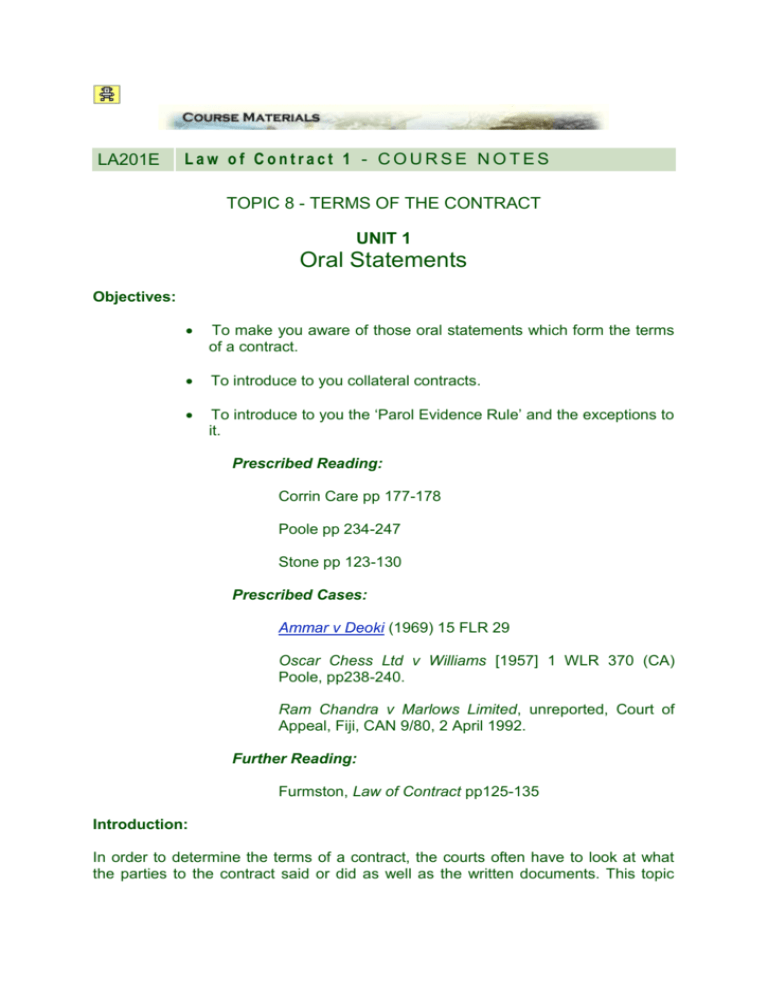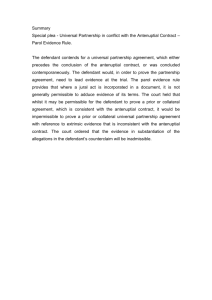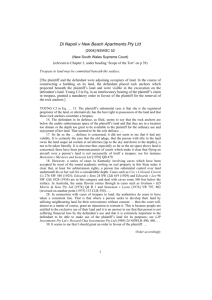Contract net notes
advertisement

LA201E Law of Contract 1 - COURSE NOTES TOPIC 8 - TERMS OF THE CONTRACT UNIT 1 Oral Statements Objectives: To make you aware of those oral statements which form the terms of a contract. To introduce to you collateral contracts. To introduce to you the ‘Parol Evidence Rule’ and the exceptions to it. Prescribed Reading: Corrin Care pp 177-178 Poole pp 234-247 Stone pp 123-130 Prescribed Cases: Ammar v Deoki (1969) 15 FLR 29 Oscar Chess Ltd v Williams [1957] 1 WLR 370 (CA) Poole, pp238-240. Ram Chandra v Marlows Limited, unreported, Court of Appeal, Fiji, CAN 9/80, 2 April 1992. Further Reading: Furmston, Law of Contract pp125-135 Introduction: In order to determine the terms of a contract, the courts often have to look at what the parties to the contract said or did as well as the written documents. This topic basically tries to determine the status that the courts give to oral statements, which are made in the course of negotiations between the parties to the contract. Oral Statements: Terms in a contract do not have to be in writing. A contract may consist entirely of oral statements or it may be partly in writing and partly oral.i[i] In Oscar Chess v Williams ii[ii] Denning MR laid down the intelligent bystander test as follows; “The question whether a [term] was intended depends on the conduct of the parties, on their words and behaviour, rather than on their thoughts. If an intelligent bystander would reasonably infer that a warranty was intended, that will suffice.” Case laws seem to indicate the following as tests to assist in determining ‘contractual intention’. Time Writing Special knowledge or skill Importance in the minds of the parties Time: The case of Routledge v McKay [1954] 1 WLR 615 is authority for the view that if there is a long time between the oral statement and the entry into the contract, then the oral statement is not part of the contract. In this case the defendant and the plaintiff were in the process of discussions for the potential purchase of the defendant’s motorcycle by the plaintiff. The defendant referred to the registration book and stated to the plaintiff that it was a 1942 model. The statement was made on the 23rd of October. On the 30th of October the parties entered into a written contract of sale, and this written contract failed to mention the date of the model. Later it was discovered that the model was actually a 1930 one, and not 1942. However the plaintiff could not recover damages as there had been an elapse of a long time between the statement and the written contract, and the statement was held as not being part of the terms of the contract. Pause now and read the case of Routledge v McKay [1954] 1 WLR 615. And see if you can follow the judge’s reasons as to why the oral statement was not part of the contract? In contrast one can refer to the case of Schawel v Reade [1913] 2 IR 81 where the plaintiff wanted a horse for stud purposes and was examining the defendant’s horse. The defendant told him “You need not look for anything: the horse is perfectly sound.” The plaintiff stopped his examination, and after a few days agreed to purchase the horse. The trial judge held that the oral statement by the defendant was part of the terms of the contract because it was made ‘at the time of the sale’. Pause now and read the case of Schawel v Reade [1913] 2 IR 81. Why did the oral statement form part of the terms of the contract when the contract was not entered into on the same day? Oral Statements reduced to Writing: If the oral statement is not included when the contract is being written, then probably it is not a term of the contract. This follows the view that courts will presume that a written document is complete. However, this presumption can be rebutted if there is evidence to the contrary. In Birch v Paramount Estates Ltd. (1956) 168 Estates Gazette 396iii[iii] the defendants, developers of an estate offered a house that they were building to the defendant. They stated that ‘it would be as good as the show house’. Later the plaintiff agreed to buy the house. However, the written contract made no reference of this oral statement of the defendants. The house failed to meet the requirements of the show house and the plaintiff sued. The Court of Appeal treated the defendants’ oral statement as part of the contract and the plaintiff was entitled to damages.iv[iv] Special Knowledge or Skill: If the person who made the oral statement has special knowledge or skill in comparison to the other party then the courts are more likely to treat the statement as a term of the contract. The case of Birch v Paramount Estates Ltd is good authority for this proposition and the property developers were held liable for not building the house to the standard of the show house. See above. The case of Oscar Chess v Williams [1957] 1 All ER 325 illustrates the importance of this principle. In this case the defendants wanted to obtain a new Hillman Minx from the plaintiffs who were car dealers. The defendants also wanted to exchange their Morris, and the trade in value of the Morris depended on the age of the Morris. The Morris was registered as a 1948 model in the Registration Book and the defendant confirmed this in good faith, and the plaintiffs agreed to pay £290 for the Morris. After eight months the plaintiffs discovered that the Morris was a 1939 model and only valued at £175. The plaintiffs then sued the defendant for the extra £115 that they had paid. The Court of Appeal held that the statement as to the age of the Morris was not a term of the contract. It is useful to compare this case with Dick Bentley Productions v Harold Smith (Motors) [1965] 1 WLR 623 (CA) where the reading made by a private car dealer that the car had done only 20,000 miles when it had actually done 100,000 miles was held to be a term of the contract. The decision in Oscar Chess was influenced by the fact that the private vendor had honestly believed on reasonable grounds that the statement as to the age of the car was true. However, the motor dealer in Dick Bentley was in a position to know the true mileage, thus emphasizing the view that a statement made by a person with special skill or knowledge will most probably be a term of the contract. Pause now and read the case of Oscar Chess v Williams [1957] 1 All ER 325. Also read the case of Dick Bentley Productions v Harold Smith (Motors) [1965] 1 WLR 623 (CA), and see if you can distinguish between the two. Importance in the Minds of the parties: The general position seems to be that if the statement was important in the minds of the parties then it is probably a term. The presence of the above indicates the intention of the parties when they entered into the contract. The region seems to follow the common law approach. Webster J outlined the objective test in the following manner in Sun Islands Inc v Fewtrell [1991] TLR 8 at 9: The intention of the parties is, as a general rule, to be construed objectively. The language used by one party, whatever his real intention may be is to be construed in the sense in which it would be reasonably understood by the other, or at least in the sense in which a reasonable person would construe it. Collateral Contracts: A collateral contract is one that exists alongside or is related to the same subject matter as the main contract. In City and Westminster Properties (1934) Ltd v Mudd [1959] Ch 129 an oral assurance by the landlord that he would not enforce a covenant against residing on the premises was held to have constituted a collateral contract. The case of De Lasalle v Guildford [1901] 2 KB 215 (CA) is a further example. In this case the parties negotiated a lease of a house. The terms of the lease were agreed but the tenant refused to conclude the deal unless the landlord assured him that the drains were in good order. The defendant said that they were in order, but it turned out that they were not in order and the plaintiff sued. The Court of Appeal held that the plaintiffs’ entry into the main contract was his consideration for the collateral contract, which had been established by the defendants’ promise that the drains were in order. There seems to be three requirements for the establishment of a collateral contract. · Firstly, the person who makes the oral statement must have intended the statement to be relied upon. · Secondly, the person to whom the statement was made must have relied on the statement and entered into the main contract based on that reliance. · And finally, the promise made in the oral statement must not be inconsistent with the terms of the main contract. Parol Evidence Rule: The case of Henderson v Arthur [1907] 1 KB 10 has defined the ‘parol evidence rule’ as follows: Extrinsic evidence, especially oral evidence, may not be admitted to add, delete or vary the terms of a contract which has been put in writing. The regional case of HP Kasabia Brothers Ltd. v Reddy Construction Company Ltd. (1977) 23 FLR 235, 255 has also summarised this rules as follows: …the express words of the contract must first be construed in the surrounding circumstances but not on the basis of what the parties may have said was their intention at the time. Nor can any prior or subsequent conduct determine the meaning of their written contract unless there is more than one way in which the contract can be construed, that is, unless there is an ambiguity in the way in which the terms are recorded in that event subsequent conduct may be looked at. The paramount task of a court is to consider the express words used, considering them, of course in the context of the whole of the provisions in the writing and the relevant background. It is beside the point that the parties may consider their obligations to be different from the express terms of the recording instrument. That can only be a matter for rectification or estoppel. If the written words are capable of being given a meaning then that is the intention and obligation in accordance with the writing.” Pause now and read the regional case of HP Kasabia Brothers Ltd. v Reddy Construction Company Ltd. (1977) 23 FLR 235. Parol evidence rule applies to determine the terms of the contract. So generally what is not written in the contract is not a term of the contract. However there are some exceptions highlighted below. Exceptions: Evidence that the written contract has not come into operation yet In Pym v Campbell (1815) 119 ER 903 oral evidence was allowed to show that the written agreement did not have any force until the oral condition was satisfied. That condition being the approval of the intention by a third party. Pause now and read the case of Pym v Campbell (1815) 119 ER 903. Evidence of Trade Usage or Custom According to Hutton v Warren (1836) 150 ER 517 the ‘parol evidence rule’ can not be used to exclude a well known trade usage or custom relating to the subject matter of the contract. Evidence of a Collateral Contract: Collateral contracts are often composed of oral statements, and evidence of collateral contracts is not excluded by the ‘parol evidence rule’. The regional case of Ammar v Deoki (1969) 15 FLR 29 follows the approach of De La Salle v Guildford [1901] 2 KB 215 where the plaintiffs were allowed to adduce oral evidence not to prove the terms of the contract but to show evidence of the collateral contract. In Ammar v Deoki the transfer of the deceased’s lease to her daughter was done pursuant to a written contract. And, oral evidence was admitted to prove that there was a collateral contract between the deceased and her daughter whereby the deceased had transferred the lease to her daughter for £500 instead of £1200. Evidence of Consideration: The case of Ammar v Deoki is authority that parol evidence should be adduced to show the existence of consideration. Be it true consideration or additional consideration parol evidence is admissible even if the parol evidence is contradictory to the written contract, a receipt or even a deed. Pause now and read the case of Ammar v Deoki (1969) 15 FLR 29. In this case oral evidence was admitted to show what? ANSWER Invalidity: Evidence can be brought to show that a contract is invalid. An example would be evidence of a mistake when a oral agreement is reduced to writing. The case of Joscelyne v Nissen [1970] 2 QB 86 is authority for this exception. In that case a daughter and father made an agreement that the father could live on the ground floor of the daughter’s house free of rent and all outgoings. It was also agreed that the daughter would pay for gas, electricity, coal bills and the cost of home help for her mother. When the agreement was reduced to writing it did not expressly state that she was to pay the bills. The court held that oral evidence would be allowed to show that the written contract was invalid due to the mistake of the parties in correctly recording what had been agreed. SELF ASSESSMENT: · What are the tests for determining contractual intention as portrayed by cases? · What are the requirements for the establishment of a collateral contract? · Define ‘parol evidence rule’ in your own words. · What are the exceptions to the ‘parol evidence rule’? · What were the facts of Ammar v Deoki (1969) 15 FLR 29? · In which case was the intelligent Bystander Test laid down by Lord Denning? A. Joscelyne v Nissen [1970] 2 QB 86 B. De La Salle v Guildford [1901] 2 KB 215 C. Birch v Paramount Estates Ltd. (1956) 168 Estates Gazette 396 D. Oscar Chess v Williams [1957] 1 All ER 325 · Joseph agrees to sell his car to Mary. Mary agrees to buy the car after Joseph repairs the Air Conditioner. They then enter into a written agreement, and the sale takes place. The written agreement failed to contain any clause directing the liability for the repair of the Air Conditioner to Joseph. Can Mary hold Joseph liable for repairing the Air Conditioner? HINT E ND NOT E S i[i] Corrin J C, Newton T, Paterson D (1999) Introduction to South Pacific Law, Cavendish Publishing Ltd, London, 177. ii[ii] [1957] 1 WLR 370, 375 per Denning MR. iii[iii] Cited in Oscar Chess Ltd. v Williams [1957] 1 All ER 325 at 329. iv[iv] Cheshire, Fifoot & Furmston, Law of Contract, 13th ed, Butterworths, London, 1996, 132.




